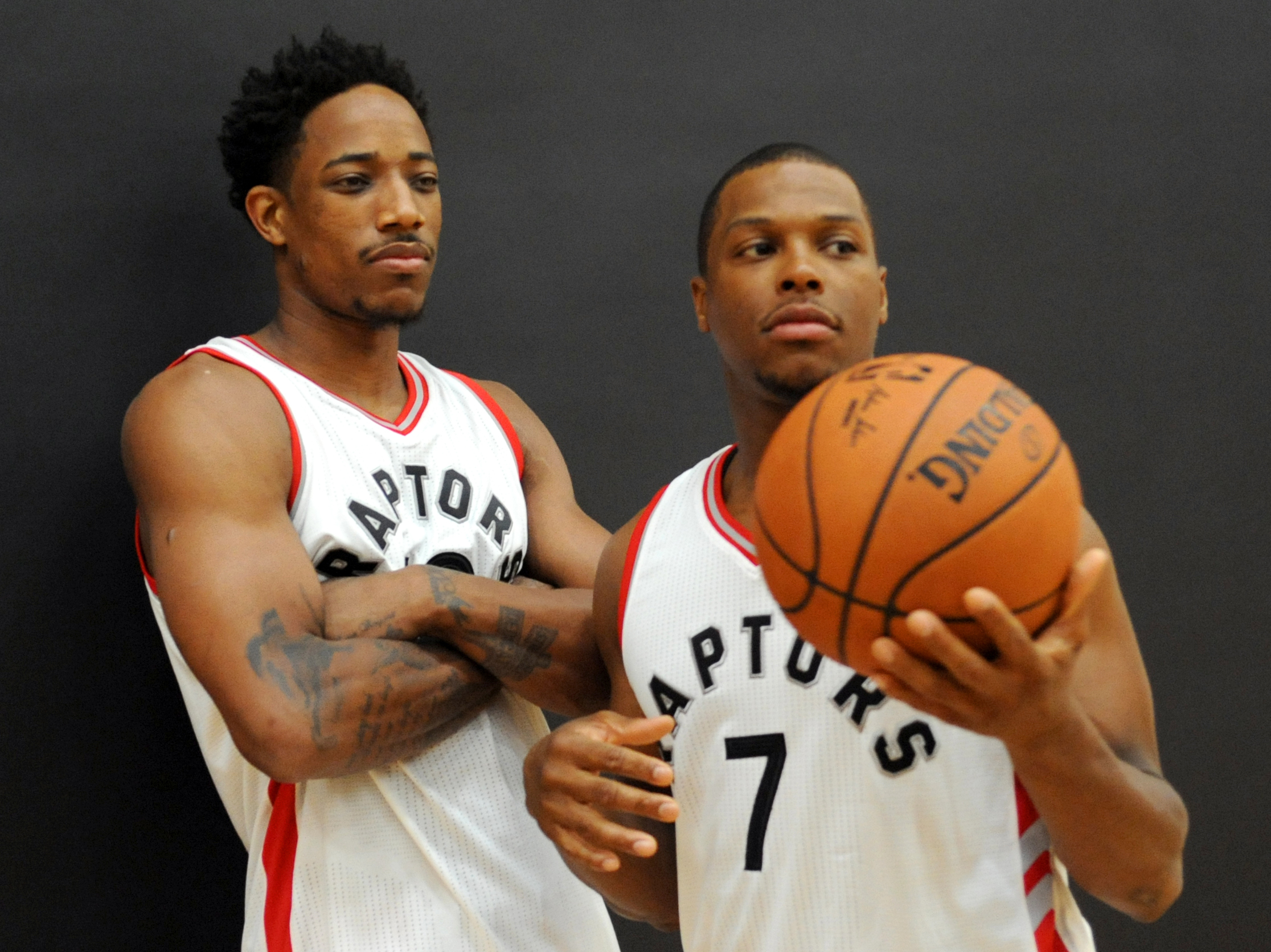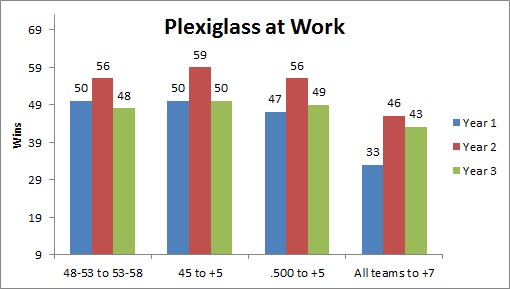SMART.
As far back as Edwin Locke, organizational behaviorists, performance psychologists, and others dedicated to figuring out what drives performance have held that goal-setting is instrumental to maximizing task performance. Not only are goals necessary, the goal-setting theory of motivation outlines that goals need to be specific, measurable, and attainable (along with the ‘R’ and ‘T’ in the simplified but oft-cited SMART acronym). Goals are important, but they have to be goals set with a real purpose other than to just have goals, otherwise they’re unlikely to help improve functioning for the individual or group.
If the Toronto Raptors subscribe to the belief of Locke et al., setting a benchmark for the 2016-17 NBA season could prove difficult.
It’s not that the Raptors don’t have goals, because they do. At the individual level, each player surely has an area he wants to improve, a role he wants to carve out, possibly a statistic or an achievement he wants to reach. And those are great. Those, too, can be important drivers of performance if they exist realistically within the confines of the team (Bruno Caboclo can’t set the goal of averaging 40 minutes per-game at the NBA level).
From a group perspective, though, anything the Raptors want to achieve this year may exist in the grey, in the subjective, and in the vaguely defined.
Last season, the Raptors had one very clear goal as a group: To win a playoff series. After two seasons of failing to do so – and a two-decade history of never doing so in a seven-game series – that one was obvious. They had higher hopes (later in the year, the goal would temporarily become the top record in the Eastern Conference), too, and those stretch goals are important to chase. But the primary, galvanizing goal was to win a playoff series.
In surpassing that goal and winning two series, and coming within two games of the NBA Finals in the process, the Raptors haven’t left themselves with a tangible target for this season. This is, to paraphrase Marlo Stanfield, one of those good problems: Jumping ahead of a more linear development timeline and taking an additional step forward, without a clear path to taking the next step after that. The Raptors could say they want to jump from 56 wins to 60, for example, but that doesn’t really move the needle much in terms of evaluating the overall quality of the team or success of the season. It would be setting a target just to set one.
It’s also pretty rare, based on a quick study of team records since the Raptors entered the NBA. Because of regression, turnover, aging, and a confluence of other factors, improving year-over-year in linear fashion is tough in the NBA. Over the last two decades, teams who improved by seven or more wins one year won two fewer games the year after. Teams who were already .500 and then won five or more games the next year took a step back by seven games on average, and that was even more pronounced (eight games) for teams that were already established at a 45-win level. To get really specific, teams like the Raptors who made the jump from the 48-53 win range to the 53-58 win range lost almost all of that progress, on average, winning 48 games the following year.
(It’s worth noting here that I prorated for an 82-game schedule in the case of shortened seasons.)
That’s a lot of ways to say that regression is tough to tip-toe around, even once a team establishes itself as very good. The only teams to go from the 48-53 win range to the 53-58 one and continue improving did so by three games or fewer, and it’s only happened four times since the Raptors entered the league. These win buckets are somewhat arbitrary cut-off points, and the Raptors don’t have the massive loss like some of the other teams who took major steps back do (Bismack Biyombo falls short of “Paul George to miss the season” levels), and yet still it’s pretty clear that substantial year-to-year jumps in win total are rare at the highest heights of the league. And that’s all before factoring in that the Raptors owned the point differential of a 53-win team rather than a 56-win team.
Now, all of that seems negative, and it all goes into my 51-win prediction a little bit, but it’s not meant as pessimism, at all. It’s more a positive, really, in that the Raptors have reached a point where they’re going to be measured by a different, more subjective but ultimately more important stick. Even if they did make a jump in win total, it might not mean anything, to them or to anyone else. Regular-season wins are great and point differential can be a helpful harbinger of playoff success, but the Raptors will almost surely measure themselves only by the postseason.
It’s a fortunate place to be in, it’s just also one that leaves the team speaking in generalities when it comes to the mission for the coming year.
“Go out there and compete,” DeMar DeRozan offered Monday when asked what a successful season would entail. “We understand starting tomorrow we’ve got to come together. Tomorrow is day one of our journey. It’s not going to be pretty. We may not win as many games as we did last year but at the end of the day that could make us a better team going into the postseason and that’s what we’ve got to keep in mind.”
That was a popular refrain on media day. This team knows they’ll be measured beginning in April, and a great deal of the focus is on getting to that point in time playing the best basketball they can be. That might mean easing the load on the team’s stars – definitely a smart approach, based on recent studies (the Raptors have 17 back-to-backs but avoid any stretches of four games in five nights) – and entrusting the team’s young core a little bit more. It may also mean taking a more cautious approach with injuries, like the one DeMarre Carroll is still dealing with as camp opens.
“My main objective is to try to help this team defensively, and keep that same defensive mindset, the physicality mindset,” Carroll said. “Try to help DeMar and Kyle to some extent so when we get to the playoffs, they’re not exhausted.”

Head coach Dwane Casey spoke in some what circular terms, saying the expectation is continued growth and the measure of that is winning, but also that the playoffs are the measuring stick. Team president Masai Ujiri spoke about the team learning how to win and how to grow from within, and while the Raptors are well on their way to establishing that culture, becoming a “winning franchise” may only represent repeating at this very high level of success rather than taking a new, obvious step forward each and every season.
“To me, expectation in sports is winning. That’s the mandate in sports. It’s all about winning,” Ujiri said of the organization’s target. “I don’t know where to put it…I really don’t like to do that before the beginning of the season. We’re going to go out there and compete and be the best we can be.”
That’s how they should be thinking, however nonspecific it sounds. And to be clear, the next step is exceedingly difficult: Making the jump from fringe “maybe if LeBron James gets injured, they can go to the finals” pseudo-contender (a very nice place to be, given the history of the franchise, by the way) to “legitimate title contender.” The lack of flexibility the team had this offseason and the smart decision to value continuity and flexibility moving forward precluded the team from adding a piece to take that jump, if such a piece even existed. And so the ultimate goal, and the logical next step, may fall short of the “attainable” criteria.
“I think me personally, I think it’s time, I want a ring,” Kyle Lowry said. “I want to win a championship. Be the best team we can be once the regular season’s over, and then go from there.”
That’s not to say having that stretch goal in place isn’t a good thing. The Raptors were close last year, and it’s the experience of that proximity that can push the holdovers to fight to get back there. Imagine Sisyphus shooting jumpers, and all that.
“The motivation of knowing what it felt like being two games away from having an opportunity to compete for a championship,” DeRozan said. “And using that motivation going into tomorrow, the first day of training camp, and understanding that we’re at the bottom of the hill now. We’ve got to work our way up and take on every challenge that we’re going to face.”
The lack of a firm, whiteboard-able goal doesn’t mean the Raptors are set to underachieve this season. They’ve just achieved enough that the next step isn’t immediately clear. “Be better” has never really lead anyone astray.
While you’re here, I also created a Facebook page where I’ll post all of my articles/radio spots/podcasts, some of which don’t end up re-posted here at Raptors Republic. Give it a like. Or not.




